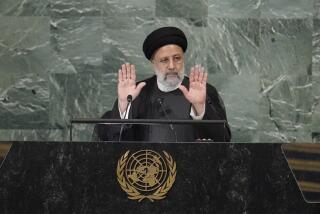Is Hussein Ready to Deal? : His neighbors hope not, since Iraqi oil would depress the market
- Share via
The sweeping trade sanctions imposed by the United Nations on Iraq after it invaded Kuwait in 1990 remain in force, though once again there is a chance to modify them under conditions that would help improve the lot of the long-suffering Iraqi people.
An offer first made by the U.N. Security Council five years ago to allow Saddam Hussein’s regime to sell limited amounts of oil on the world market, with most of the revenue to be used to import food and medicine, was recently renewed. Iraq’s announcement that it was ready to talk seriously about the proposed plan set off jubilation in the streets of Baghdad. The Iraqi dinar strengthened against the dollar and food prices, hyperinflated by years of shortages, fell sharply. But two weeks of technical talks have now ended without yielding a political agreement. The question is whether Hussein, who has always protested that any U.N.-imposed conditions would unacceptably infringe on Iraqi sovereignty, is at last ready to do something to benefit those 20 million Iraqis who are not part of the small and pampered ruling elite.
A lot of Iraq’s neighbors and other oil exporters quietly hope that he is not ready to end his rejectionist stance, since adding millions of barrels of Iraqi oil to the world market would work to depress prices and profits. Under the U.N. plan, Iraq could conditionally sell $1-billion worth of oil every 90 days on a renewable basis. Most of that oil would have to be transported through a Turkish pipeline--a reward to Turkey for its help in the Gulf War--and U.N. monitors would be stationed in Iraq to make sure that newly imported food and medicine reached those ordinary people who are most in need, rather than the military and political leadership whose loyalty to Hussein continues to be bought with a generous supply of luxury imports.
Hussein has always gambled that international sympathy for the plight of the Iraqi people would eventually force the Security Council to drop or modify its sanctions policy. That hasn’t happened, and the United States and Britain are especially and rightly firm in insisting that it won’t. The fact that Hussein agreed even to take part in technical talks on easing oil sales could indicate a new concern that the Iraqi people may be nearing a breaking point. The talks are scheduled to resume next month. By then, maybe, Hussein will have decided just how much he has to fear from an increasingly underfed and restive population.
More to Read
Sign up for Essential California
The most important California stories and recommendations in your inbox every morning.
You may occasionally receive promotional content from the Los Angeles Times.













